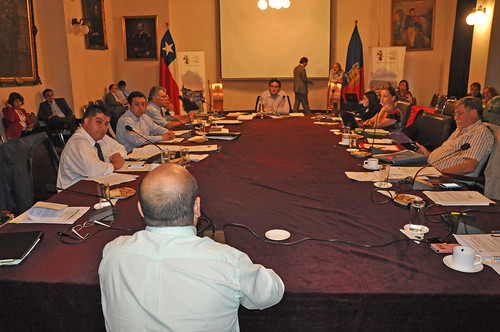WOMEN LGBT Rape & Sexual Assault Awareness by Gina M. Rivera
Gina is a survivor of assault. During her career as a Correctional Officer, she successfully fought off and subdued two male maximum security level IV inmates who were attempting to kill her…
www.youtube.com/watch?v=KUOBaaDgueI&feature=youtube_gdata
Daily Archives: March 25, 2015
Valparaíso aprueba por unanimidad Ordenanza por la Diversidad y la no Discriminación / @Movilh 2015

LGBT Speech 1
LGBT Speech 1
Made for English Class.
California AG Seeks to Quash 'Death to Gays' Proposal
California AG Seeks to Quash 'Death to Gays' Proposal
Attorney General Kamala Harris is seeking court action to keep the proposed ballot measure from going any further.
Trudy Ring
www.advocate.com/politics/2015/03/25/california-ag-seeks-quash-death-gays-proposal
What Fundamentalists Are Missing About Religious Freedom Bills
What Fundamentalists Are Missing About Religious Freedom Bills
I grew up in southern Indiana right where the Ohio River makes a curly seam against Kentucky. I was a Southern Baptist boy, at first by tradition and then by choice. That’s what we Southern Hoosiers did in those days.
Those circumstances were the perfect yet unfortunate set up for a lot of heartache. As my teenage years progressed, I gradually discovered that I was the devil in disguise, so to speak, for everyone around me. I was a homosexual, the despised and mythical creature about whom the Sunday school teacher warned us. I’m being dramatic about it now, but back then the stakes were quite high.
Nothing seems to change in my home state. It seemed a bit of a miracle when the marriage ban was struck down, then perhaps a bit predictable when Indiana became the latest state to pass a religious freedom act. On Monday, the state became the latest to pass such legislation. Gov. Mike Pence has said he’ll sign it.
I’m no longer a Christian, but I very much remember the mindset of the fundamentalist. Modern American fundamentalism is a faith of mean-ness — of exclusion — of turning your fears into God’s will and your gossip into prayer requests. I remember it well.
The irony is they completely think they’re doing the right thing…what Jesus would do.
The Jesus Christ of my imagination gladly makes flowers and cakes for gay people. I mean, that seemed to be his M.O. in scripture, hanging out with and helping people regardless of what they believed. Alas, the Jesus Christ of my imagination is irrelevant. What matters now is the savior in the minds of those pressing for the protection of their so-called religious freedom.
It seems an easy realization, that this religious freedom comes at the cost of oppressing another. But in defense, they would very much say the same applies to them, and now we are in a Catch 22 of prejudice.
The answer (and I can’t believe I’m about to say this) is Jesus. The man who who loved all unconditionally. For those so concerned with the inevitable coming of gay marriage, is it not time to sincerely ask, “What would Jesus do?”
Where Did “Looking” Go Wrong?
Where Did “Looking” Go Wrong?
 It’s official. HBO’s Looking will not be returning for a third season. Despite a small but dedicated fan base, the series experienced a sharp decline in viewers during season two, so this news doesn’t come as a complete surprise.
It’s official. HBO’s Looking will not be returning for a third season. Despite a small but dedicated fan base, the series experienced a sharp decline in viewers during season two, so this news doesn’t come as a complete surprise.
While the series may be over, HBO has announced it will produce a TV special to tie up the story’s loose ends for loyal fans.
As one of the few series on television that was created by a gay man (Michael Lannan), written by a predominantly gay staff and that starred many out actors (Jonathan Groff, Murray Bartlett, Daniel Franzese, Russell Tovey), it’s a shame there wasn’t more support from LGBT viewers, who criticized the series even before it had premiered for not representing every facet of the queer community.
So if you watched the series, here’s another chance to weigh in on these pressing questions: Where did Looking go wrong? And do you think HBO can turn things around with its planned TV special?
Sound off in the comments section below.
Graham Gremore
feedproxy.google.com/~r/queerty2/~3/hjNlIseSZkk/where-did-looking-go-wrong-20150325
His Gay Dad and The Stonewall Riots Led This Man to a Calling and a $1 Million TED Prize: VIDEO
His Gay Dad and The Stonewall Riots Led This Man to a Calling and a $1 Million TED Prize: VIDEO
What are the things you’d like to say to an important person in your life before they, or you, die? Thank you? I love you? Forgive me? I forgive you?
Every year the $1 million TED Prize is awarded to a leader with a bold vision for sparking global change. This year’s winner was Dave Isay, a radio producer with a vision of capturing the world’s stories which was prompted by an experience he had after his father came out to him as gay, and told him the story of the Stonewall Riots.
This experience sparked an idea: StoryCorps. Isay opened a booth in New York’s Grand Central Station in which people could listen to each other’s stories, and record them for posterity. The idea became a mobile booth which traveled the country and helped StoryCorps grow into the largest collection of human voices ever recorded.
Says Isay in this incredibly moving TED Talk: “It takes some courage to have these conversations. StoryCorps speaks to our mortality. Participants know this recording will be heard long after they are gone.”
Also in the talk, Isay reveals the stories (and plays some of them) that have touched him over the past few years and the vision he has going forward. That vision includes an app which was launched at the TED conference which people can use to easily record interviews and submit them to StoryCorps.
Watch the TED talk, AFTER THE JUMP…
Andy Towle
Samedi Army ft. Demo Demon – Equality (LGBT Song)
Samedi Army ft. Demo Demon – Equality (LGBT Song)
A 2013 LGBT/Equal rights song from Samedi Army, featuring Kendan Reeves, Alexander and Demo Demon.
www.youtube.com/watch?v=wK4YkV9hp9M&feature=youtube_gdata
#4thSATURDAYs with #TMS & #MADMAXMEDIA!!!!! = Partying with the grown & sexy!!! —- THIS SATURDAY 👯 THIS SATURDAY WE ARE AT VITA LOUNGE FOR #RECESS HOSTED BY DMV's OWN PINKY▪KILLA▪CORN (@pinkykillacorn)…10-3am…OPEN BAR FROM 10-11pm…SEE YALL

WATCH: SXSW Attendee Says He Was Assaulted, Called Gay Slur
WATCH: SXSW Attendee Says He Was Assaulted, Called Gay Slur
He says a bouncer at the W Hotel yelled a gay slur and assaulted him in front of friends.
Raffy Ermac
www.advocate.com/crime/2015/03/25/watch-sxsw-attendee-says-he-was-assaulted-called-gay-slur
